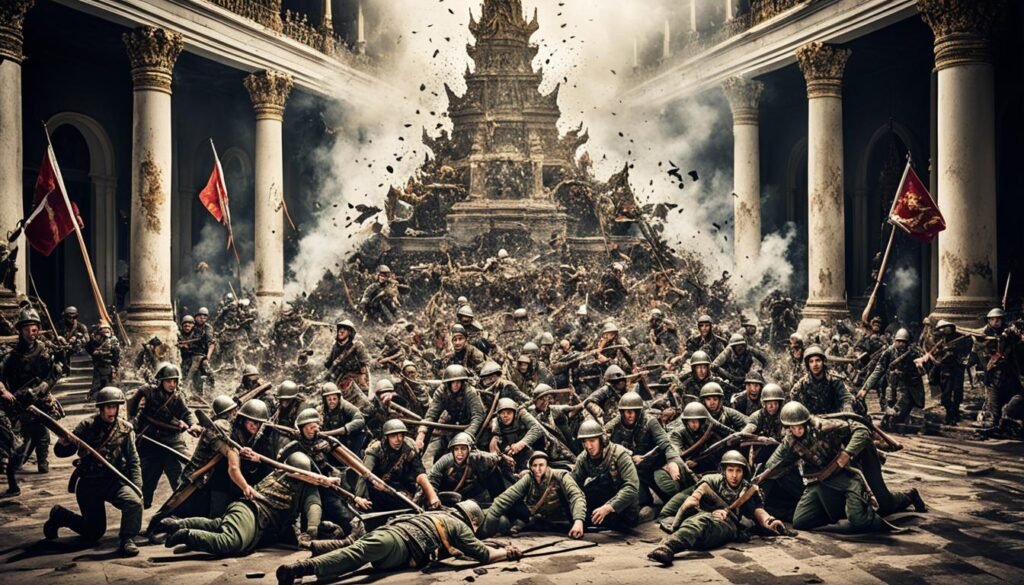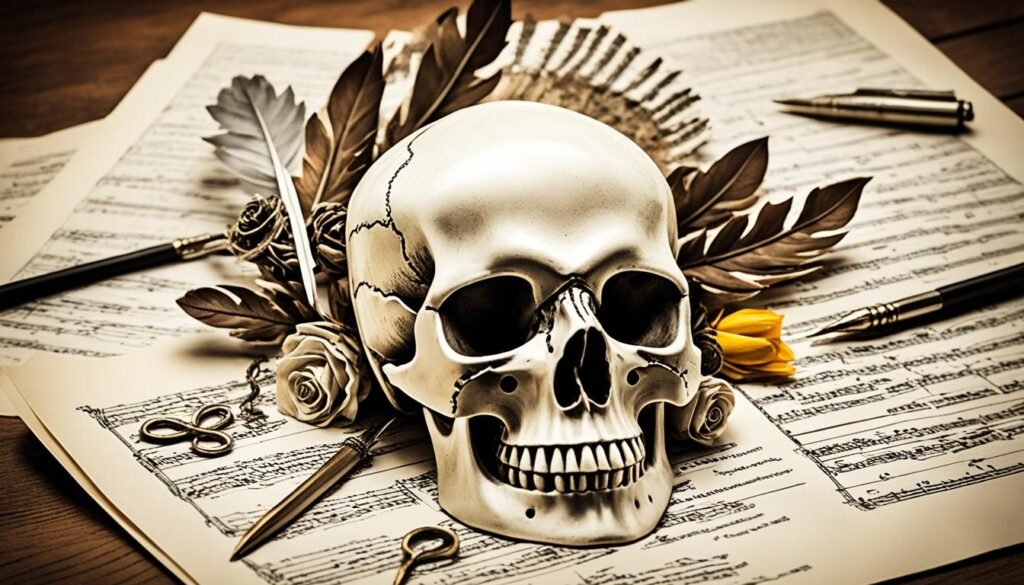History is full of incredible events that have changed the world. We have seen many astonishing things that seem almost magical. This article will talk about the top 10 most unbelievable events in history. These events have deeply influenced humanity. Get ready to go on a journey through time as we look at these amazing stories that are hard to believe.
Key Takeaways:
- Unbelievable events throughout history have shaped the world we live in.
- These events continue to captivate and intrigue people to this day.
- From astonishing moments to jaw-dropping occurrences, we will explore the top 10 unbelievable events.
- Get ready to be amazed as we delve into these incredible stories.
- Stay tuned to discover the remarkable moments that defy belief.
The Norman Conquest Alters England Forever
In 1066, the Norman Conquest changed English history forever. William the Conqueror led the Normans to victory at the Battle of Hastings. This victory changed the nation’s direction for good.
William’s win ended Anglo-Saxon rule and started Norman control. It laid the base for the monarchy and feudal system. These shaped English society for many years.
The Conquest deeply affected the English language. As Normans became part of English society, their language mixed with English. This created a new form of language.
This mix led to Middle English. It became England’s main way of speaking. This change added many French words to English. It made the language more complex and rich.
William the Conqueror’s Decisive Victory at Hastings
William’s win at the Battle of Hastings was a key moment. It took place on October 14, 1066. William fought against Harold II, England’s last Anglo-Saxon king.
The battle was long and fierce. William and his disciplined army overcame Harold’s strong defense. This victory was a game-changer.
The English defeat was huge. Harold II died, and the Anglo-Saxon elites fell. William became king, starting Norman rule and a new dynasty.
The Reshaping of English Society and Language Post-1066
The Conquest changed English society greatly. The Normans brought in a feudal system. This made a society with clear ranks, with the king at the top and peasants at the bottom.
This change wasn’t just social; it also changed English itself. English and Norman French merged over time. This created Middle English.
This new language helped grow English literature and culture. Over time, English came back as the main language. It led to the English we use today.
Magna Carta: The Cornerstone of Modern Democracy
In 1215, the sealing of Magna Carta marked a huge step for democracy. This important document reduced the king’s power and ensured rights for the people. It helped shape the democratic ideas we value today, like human rights and limits on power.
The Sealing of Magna Carta and Limitation of Royal Power
King John of England and his barons signed the Magna Carta in Runnymede. It aimed to fix their complaints and ensure the king respected everyone’s rights. Among its rules were fair legal treatment, protection from being jailed without reason, and the right to a trial by jury.
This document made it clear that even the king must follow the laws. It introduced fair legal processes and laid the groundwork for today’s legal rights. It also looked out for widows and set limits on fines and taxes, helping both barons and ordinary people.
The Evolutionary Journey from 1215’s Charter to Today’s Human Rights
Over time, the principles of Magna Carta have shaped modern human rights. They’ve supported the idea of a government with limits, the rule of law, and personal freedoms. This charter influenced later legal changes that expanded rights and freedoms further.
Its impact is seen in major documents like the English Bill of Rights and the U.S. Bill of Rights. These texts protected freedoms like speech, religion, and assembly. They also shielded against unfair government searches. Magna Carta’s ideas still influence legal systems worldwide, highlighting the need for a government that respects human rights.
Magna Carta has been key to the growth of democracy. It put checks on royal power and secured essential rights. This historic document reminds us that people’s rights and freedoms are vital, no matter how powerful a ruler might be.
The Devastating Impact of the Black Death on Europe
The Black Death was a deadly plague that hit Europe in the 14th century. It killed millions and caused widespread fear and chaos. This tragic moment changed society forever.
This plague started in Central Asia and reached Europe in 1347. It was caused by fleas carrying the Yersinia pestis bacterium. Because people didn’t understand hygiene, the disease spread fast.

The Black Death is estimated to have killed 30-60% of Europe’s population. It destroyed towns and villages. The impact touched every part of life, from farms and trade to religion and culture.
The economy took a hard hit due to the Black Death. With so many dead, farms produced less food. This made food prices shoot up. As people struggled to survive, trading nearly stopped.
The social impact was huge, too. A lot of people died, leaving survivors scared and distrustful. Sadly, many blamed and persecuted Jews. The psychological scars changed those who lived through it.
Many people began to question their faith. They wondered why such suffering was happening. This doubt weakened the church’s power.
The effects of the Black Death changed Europe in big ways. It altered the economy, society, and culture. This disaster is a key part of European history.
| Impact of the Black Death on Europe | % of Population Lost |
|---|---|
| Estimated total deaths | 25 million |
| Death toll in some cities | Up to 75% |
| Decline in agricultural production | 30-50% |
| Decrease in trade volume | 80-90% |
| Impact on religious institutions | Loss of authority and influence |
| Societal upheaval | Massive social and cultural changes |
Divisive Dynastic Struggles Invoke the Wars of the Roses
In the 15th century, England faced a lot of conflicts, known as the Wars of the Roses. These were due to fights between the York and Lancaster houses. They both wanted the English throne, causing division and instability.
The Wars of the Roses came from family feuds and power fights. The York House, with its white rose, and the Lancaster House, with its red rose, battled for control. Noble supporters backed each side.
These battles had huge effects on England. Many nobles and important people died, including kings. This caused more instability and made people question the monarchy’s legitimacy.
After all the fighting, Henry Tudor from both York and Lancaster houses won. He became Henry VII, starting the Tudor dynasty. This ended the wars and began a new era in English history.
“The Wars of the Roses were a tumultuous period in English history, marked by fierce rivalries and bloody battles. The legacy of these dynastic struggles continues to resonate today, shaping our understanding of medieval politics and power dynamics.” – Historian
To visualize the key players and factions involved in the Wars of the Roses, refer to the table below:
| House | Symbol | Main Figures |
|---|---|---|
| House of York | White Rose | Richard, Duke of York Edward IV Richard III |
| House of Lancaster | Red Rose | Henry VI Henry VII (Tudor) |
Table: Key Players in the Wars of the Roses
This table shows key York and Lancaster figures and their symbols. It helps illustrate the rivalries and alliances of the Wars of the Roses. It also shows the complex relationships that influenced the conflicts’ outcomes.
The Wars of the Roses show how dynastic fights can change history. These conflicts changed the English monarchy and led to the Tudor dynasty’s rise. Their rule had a big impact on England’s future.

Shakespeare’s Indelible Mark on the English Language and Culture
William Shakespeare was one of history’s greatest playwrights, born in the 16th century. He left a lasting impact. His works significantly influenced the English language, shaping its words and phrases. Shakespeare introduced new expressions that have become key to English-speaking cultures.
His phrases, like “to be or not to be”, are famous worldwide. Characters such as Romeo and Juliet are unforgettable. Shakespeare’s plays keep entertaining and inspiring people globally.

Shakespeare’s plays were a hit in his time and they changed literature forever. They set the stage for modern theater and stories. His themes and characters connect with today’s readers and actors.
The cultural influence of Shakespeare goes beyond plays. It reaches into literature, music, movies, and daily talks. His works are still performed and studied in schools and theaters. This shows the lasting power of his words.
The Gunpowder Plot: A Failed Revolution
Guy Fawkes’ Brush with Assassination and National Memory
In 1605, a group of English Catholics tried to kill King James I and change the Protestant government. Led by Robert Catesby, they planned to blow up Parliament on November 5th. Guy Fawkes, skilled in warfare and part of the team, was to light the gunpowder under the House of Lords. Yet, Guy Fawkes was caught with the explosives on November 4th, stopping the scheme.
This plot revealed the harsh religious conflicts and instability in England then. The plotters aimed to bring back Catholic rule, fighting the Crown’s anti-Catholic laws. Guy Fawkes was caught, endured torture, and was killed. Today, he symbolizes defiance and the fight against oppression in British lore.

The plot’s failure meant tough times for England’s Catholics, leading to more persecution and laws against them. Yet, we remember this event every Bonfire Night on November 5th. It’s celebrated with fireworks, bonfires, and Guy Fawkes effigies being burned.
Bonfire Night: A Cultural Legacy of the Gunpowder Plot
Today, Bonfire Night is more than its historical roots. It’s a time for community fun, fireworks, and celebrations. Burning Guy Fawkes effigies shows we do not tolerate treason and praise government victory over mutiny.
The Gunpowder Plot and Bonfire Night remind us of the value of religious freedom and political stability. They highlight government strength against threats and the need to remember history. By learning from the past, we can aim for a better future.
The Decisive Battle of Waterloo Ending Napoleonic Wars
The Battle of Waterloo, fought in 1815, was a key event. It ended the Napoleonic Wars and Napoleon Bonaparte’s rule. This historic clash occurred near Waterloo in today’s Belgium.
Napoleon’s French forces clashed with the British, Prussian, and Dutch-Belgian armies. This battle wrapped up many military campaigns of the Napoleonic Wars.
The battle stood out for many reasons. It showed Napoleon’s tactics against the allies’ strategic planning. The fight was fierce, causing many losses on both sides.
The allied force’s win at Waterloo was decisive. Napoleon lost and had to give up the French throne forever. This loss stopped his dream of ruling Europe.
“Next to a battle lost, the greatest misery is a battle gained.” – Duke of Wellington
Waterloo’s effects were far-reaching. It restored France’s Bourbon monarchy and changed Europe’s power balance. The Congress of Vienna followed, aiming to keep the peace.
The battle also inspired artists, writers, and poets. It led to many works of art and stories. Victor Hugo’s “Les Misérables” famously includes the battle.
| Effects of the Battle of Waterloo | |
|---|---|
| End of Napoleon’s reign | ✓ |
| Restoration of the Bourbon monarchy in France | ✓ |
| New balance of power in Europe | ✓ |
| Inspiration for art, literature, and culture | ✓ |
The Battle of Waterloo was a pivotal moment in history. It shows the strength and courage of those who fought. Now, it stands for resilience, bravery, and the success of united fronts. Historians, military buffs, and visitors continue to explore its significant impact.
Victorian Era: A Time of Monumental Change
The Victorian Era, spanning from 1837 to 1901, brought significant change. During this time, Queen Victoria started her reign. This marked the beginning of the British Empire’s expansion.
Queen Victoria’s Ascension and the British Empire’s Expansion
Queen Victoria’s reign was a turning point for Britain. She came to the throne in 1837. This began a new era of growth and power for the British Empire. Under her rule, the empire grew larger than ever before, reaching new heights.
Queen Victoria was key to the empire’s success. Her leadership and policies made Britain a dominant force globally. The empire stretched across Africa, Asia, the Americas, and the Pacific, becoming a global powerhouse.
The empire’s growth brought wealth and influence but also conflicts. It controlled many resources and trade networks. However, it faced challenges from nations wanting freedom and self-rule.
Cultural and Industrial Revolutions Under Victoria’s Reign
The Victorian Era saw changes beyond just empire expansion. It was also a time of cultural and industrial revolutions. These changes were driven by advances in technology, science, and the arts.
This era caused a shift in society’s values. The middle class became more prominent. The period was marked by the rise of new social movements, including those for women’s rights and social reform.
Industrialization changed Britain drastically. It led to rapid urbanization. Factories and mills popped up, and new technologies changed transportation and manufacturing.
The industrial revolution brought economic growth and improved living standards for some. But, it also increased social inequality and challenged traditional ways of life.
Art and literature also thrived in the Victorian Era. Authors like Charles Dickens and Oscar Wilde made significant impacts. The arts mirrored and influenced the changes in society, exploring themes of class, morality, and identity.
The Victorian Era was a period of great shifts. Queen Victoria’s rise to power sparked the British Empire’s expansion. The cultural and industrial revolutions deeply transformed society. These changes still affect us today.
“The Victorian Era marked a turning point in British history, with Queen Victoria’s ascension and the expansion of the British Empire. Cultural and industrial revolutions shaped society and brought about monumental change.” –
Top 10 Best Unbelievable Things Happened
V-E Day and the End of WWII: A New Era of Peace
One of the most remarkable events was V-E Day, ending World War II in Europe. On May 8, 1945, German forces surrendered, stopping years of terrible conflict. This made people all over celebrate.
The celebrations of V-E Day filled streets with music, dancing, and flags. This victory brought everyone closer, showing that peace was finally possible. It also started the process of rebuilding and healing nations.
Tim Berners-Lee’s Creation of the World Wide Web and Its Global Impact
In 1989, Tim Berners-Lee changed how we communicate by creating the World Wide Web. This British computer scientist made a system for sharing information over the internet. It connected people worldwide and opened up new possibilities.
Today, the Web is part of our lives, enabling instant chats, access to information, and the rise of online shopping and media. It has changed industries, creating jobs, and changing how we learn and connect.
Berners-Lee’s invention has greatly influenced society and tech. It has made sharing knowledge easy and brought people together, despite distances.
Conclusion
Throughout history, unbelievable events have shaped society. Conquests, revolutions, cultural movements, and tech advancements changed our world. They capture our imagination and shape today’s world.
Understanding these moments helps us appreciate the past. It gives us insights into today and tomorrow. We learn about human nature, the power of ideas, and historical forces.
Significant events offer lessons. From William the Conqueror at Hastings to the Magna Carta’s impact on democracy. From the Black Death’s toll to the Gunpowder Plot’s cultural legacy.
Reflecting on these events, we see humanity’s resilience. They show the power of history to transform. Their impact remains with us, inspiring us to face today and tomorrow’s challenges.
FAQ
What was the Norman Conquest and how did it alter England forever?
What is Magna Carta and how did it contribute to modern democracy?
What was the Black Death and how did it impact Europe?
What were the Wars of the Roses and how did they affect England?
How did William Shakespeare leave a lasting impact on the English language and culture?
What was the Gunpowder Plot and why is it remembered in British history?
What was the Battle of Waterloo and how did it reshape Europe?
What characterized the Victorian Era and how did it bring about significant change?
What were V-E Day and Tim Berners-Lee’s creation of the World Wide Web?
What are some other incredible events that have shaped history?
Source Links
- https://www.english-heritage.org.uk/learn/histories/1066-and-the-norman-conquest/top-10-moments-from-history/
- https://www.britannica.com/story/25-decade-defining-events-in-us-history
- https://www.pewresearch.org/politics/2016/12/15/americans-name-the-10-most-significant-historic-events-of-their-lifetimes/







